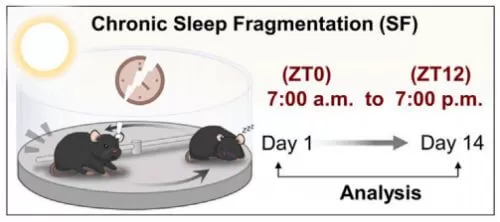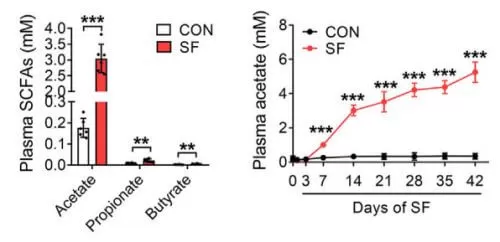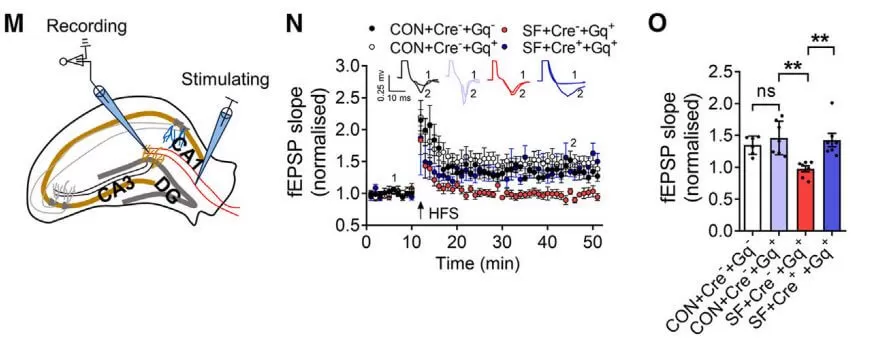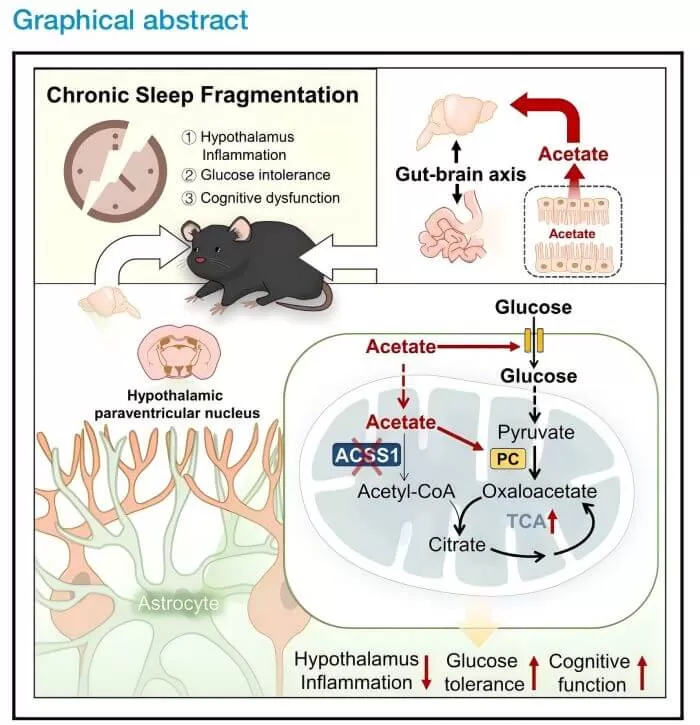Acetate Enables Metabolic Fitness And Cognitive Performance During Sleep Disruption
Sleep is a fundamental physiological process crucial for maintaining overall health, yet modern lifestyles have led to a gradual increase in poor sleep quality or inadequate sleep, which subsequently triggers various health issues such as metabolic, cognitive, cardiovascular, and immune dysfunctions. Addressing sleep disorders may hold the key to preventing metabolic dysfunctions. Nevertheless, the molecular mechanisms linking sleep disruption to metabolic impairments remain largely unknown. Today, I would like to share with you a research paper titled "Acetate enables metabolic fitness and cognitive performance during sleep disruption (article resource)," published on the cover of Cell Metabolism. This study reveals that sleep disruption leads to metabolic imbalance and cognitive impairment, while acetate supplementation activates pyruvate carboxylase, thereby restoring glycolysis and the tricarboxylic acid cycle, and improving metabolic imbalance and cognitive abnormalities. MetwareBio provided targeted metabolomic profiling of short-chain fatty acids for this research!
1. Impact of Sleep Disruption on Glucose Metabolism and Cognitive Function
 To investigate the effects of SF (Sleep fragmentation, characterized by disordered sleep architecture) on cognition and metabolism, researchers established an SF model in adult male C57BL/6J mice. The results showed that SF mice exhibited significant glucose metabolic disorders, including elevated blood glucose levels, glucose intolerance, and insulin resistance, as well as impaired cognitive abilities. Combining blood proteomics analysis with isotope labeling experiments indicated that SF disrupted glucose homeostasis and cognitive function in mice, while also reducing glucose metabolism in relevant brain regions.
To investigate the effects of SF (Sleep fragmentation, characterized by disordered sleep architecture) on cognition and metabolism, researchers established an SF model in adult male C57BL/6J mice. The results showed that SF mice exhibited significant glucose metabolic disorders, including elevated blood glucose levels, glucose intolerance, and insulin resistance, as well as impaired cognitive abilities. Combining blood proteomics analysis with isotope labeling experiments indicated that SF disrupted glucose homeostasis and cognitive function in mice, while also reducing glucose metabolism in relevant brain regions.
2. Elevated Acetate Levels in Response to Sleep Fragmentation

To further investigate the metabolic alterations in SF mice, metabolomic analysis was performed on plasma samples from SF and CON mice. The results revealed that compared to CON mice, 39 metabolites were upregulated and 7 were downregulated in the plasma of SF mice. Notably, the levels of short-chain fatty acids (SCFAs), including acetate, propionate, and butyrate, were significantly increased in the plasma of SF mice. Among the most differentially regulated metabolites, the concentration of acetate gradually increased in the plasma of SF mice compared to CON mice. Since acetate is primarily produced by gut bacteria, the researchers examined the gut microbiota composition of CON and SF mice. Cecal samples were collected post-SF induction and subjected to 16S rRNA gene sequencing analysis. Compared to CON mice, changes in the gut microbiota composition were observed in SF mice. Specifically, for acetate-producing bacteria, the abundances of Prevotellaceae, Dubosiella, and Desulfovibrio increased, while those of Akkermansia, Parasutterella, and Lachnospiraceae decreased at the genus level. Differences in bacterial community and taxonomic composition were also present between SF and CON mice. Immunohistological examination revealed significant damage to the intestinal epithelial morphology in SF mice compared to CON mice. Furthermore, acetate levels in the cecum and feces of SF mice were significantly reduced. These findings suggest a potential association between the increase in acetate-producing bacteria and disruption of the intestinal barrier, leading to elevated acetate levels in the circulation of SF mice. Interestingly, acetate levels were elevated in the hypothalamus of the central nervous system but not in the hippocampus or cortex. Further analysis showed that NREM-to-wake transitions positively correlated with acetate levels in the hypothalamus and circulation, indicating that the degree of SF may contribute to alterations in acetate levels. Isotope analysis revealed reduced acetate oxidation in SF mice, accompanied by decreased ATP production. Additionally, acyl-coenzyme A (CoA) synthetase short-chain family member (ACSS) 1, the enzyme that converts acetate to acetyl-CoA in mitochondria, was decreased in the hypothalamus but not in the hippocampus or cortex. These results suggest that reduced ACSS1 expression leads to acetate accumulation in the hypothalamus, which may impact glucose metabolism.
3. Acetate's Role in Improving Glucose Metabolism and Cognitive Performance in Sleep-Deprived Mice
Acetic acid administration reduced SF-induced food intake. After intragastric administration of acetic acid, there was no change in locomotor activity. SF mice that received acetic acid supplementation exhibited improved glucose metabolism, including improved glucose tolerance and insulin sensitivity. Similarly, acetic acid reversed the cognitive impairment caused by SF. Acetic acid is converted into acetyl-CoA by ACSS1 in mitochondria. Mice with specific knockout of Acss1 (Acss1 cKO) showed enhanced accumulation of acetic acid in the brain. Compared to wild-type (WT) mice, Acss1 cKO reversed the metabolic defects in SF mice and also improved cognitive abilities. Through AAV1 anterograde tracing experiments and patch-clamp experiments, it was discovered that modulating the metabolism of acetic acid in PVN astrocytes can influence the cognitive changes induced by SF, indicating that the accumulation of acetic acid in the PVN is an adaptive response that protects against the adverse effects of SF.

4. Acetate Activates Pyruvate Carboxylase to Restore Glucose Metabolism in the Hypothalamus
The 13C-labeled glucose experiment showed that acetic acid treatment increased the ratio of pyruvate carboxylase/pyruvate dehydrogenase in primary hypothalamic astrocytes, indicating that acetic acid enhanced the contribution of pyruvate carboxylase in glucose metabolism. Further experiments such as mixed-solvent molecular dynamics (MixMD) simulations demonstrated that acetic acid activated pyruvate carboxylase to promote glycolysis and tricarboxylic acid cycle in the hypothalamus of SF mice.
In summary, acetic acid binds to and activates pyruvate carboxylase in the hypothalamus, thereby restoring glycolysis and tricarboxylic acid cycle in hypothalamic astrocytes. This process can prevent SF-induced glucose metabolism disorders, cognitive impairments, and inflammation.

If you work with medical research and interested in running metabolomics study with clinical samples, we offer:
- SCFAs targeted metabolomics (Absolute quantification of 13 SCFAs in a single run).
Next-Generation Omics Solutions:
Proteomics & Metabolomics
Ready to get started? Submit your inquiry or contact us at support-global@metwarebio.com.


